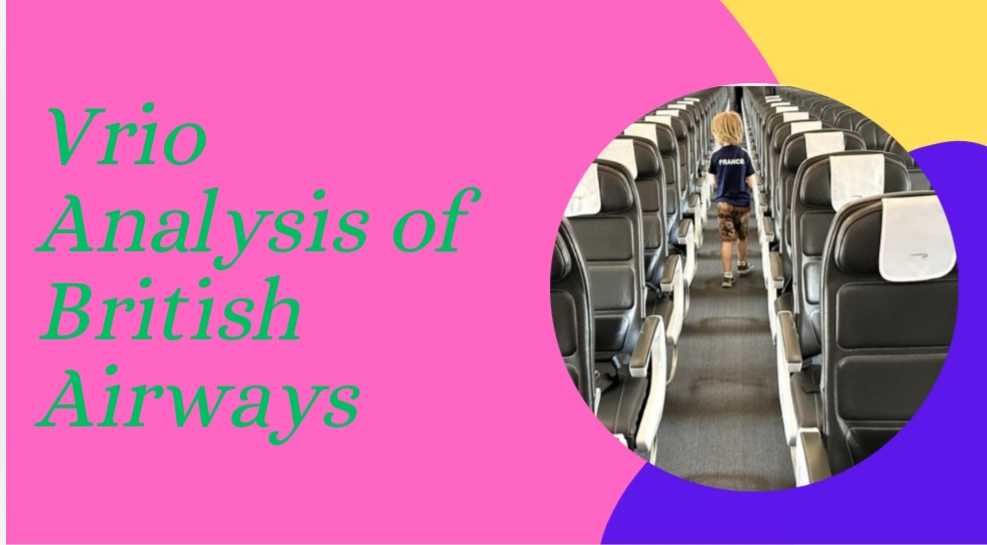British Airways (BA), one of the world’s leading international airlines, operates in a highly competitive and dynamic aviation sector. Conducting a VRIO analysis—an examination of the airline’s resources and capabilities—provides valuable insights into its strategic positioning and potential for sustained competitive advantage. By evaluating its Valuable, Rare, Inimitable resources, and the organization’s ability to leverage these assets effectively, we can better understand how British Airways navigates challenges, capitalizes on opportunities, and maintains its status as a key player in the global airline industry. This analysis will explore factors such as brand reputation, fleet capabilities, customer service, and operational efficiencies, highlighting how these elements contribute to the airline’s long-term success and resilience.
Table of Contents
ToggleValue Analysis of British Airways
In the context of British Airways’ VRIO analysis, the “Value” component examines whether the airline’s resources and capabilities contribute to its competitive advantage by enabling it to exploit opportunities or neutralize threats in the market. British Airways possesses several valuable resources, including:
- Brand Reputation: As one of the oldest and most recognized airlines, BA’s strong brand loyalty enhances customer trust and attracts frequent travelers.
- Global Network: With an extensive route network that connects major cities across the globe, BA offers travelers significant convenience and options, making it a preferred choice for international travel.
- Operational Efficiency: Investment in modern aircraft and technology allows BA to optimize fuel efficiency and reduce operational costs, improving profitability.
- Customer Service: BA’s commitment to providing high-quality service, including amenities and loyalty programs, enhances the customer experience and encourages repeat business.
These valuable resources not only help British Airways maintain its market position but also differentiate it from competitors, supporting its overall strategy and profitability.
Rarity Analysis of British Airways
In the VRIO framework, the “Rare” aspect assesses whether British Airways possesses resources or capabilities that are unique or uncommon among its competitors. Here are some key rare attributes of British Airways:
- Heritage and Legacy: As one of the founding members of the International Airlines Group (IAG), British Airways has a rich history and legacy that few airlines can match, providing a distinct identity and customer loyalty.
- Exclusive Partnerships: BA’s membership in the Oneworld alliance allows it to offer unique routes and services that may not be available to non-member airlines, enhancing its competitive edge.
- Fleet Diversity: The airline’s diverse fleet, which includes state-of-the-art aircraft, enables it to operate efficiently across various market segments and adapt to changing consumer demands.
- Premium Services: British Airways offers unique premium services, such as the exclusive First Class experience and specialized lounges, which are not widely available across all airlines, attracting high-value customers.
These rare resources contribute to British Airways’ distinct market position, allowing it to differentiate itself from competitors and create unique value propositions for its customers.
Imitability Analysis of British Airways
In the VRIO framework, the “Inimitability” component evaluates whether British Airways’ resources and capabilities can be easily replicated by competitors. Several factors contribute to the inimitability of BA’s strengths:
- Established Brand Equity: The strong brand reputation built over decades is difficult for competitors to replicate quickly. Trust and loyalty from customers take time to develop and are influenced by consistent quality and service.
- Unique Partnerships and Alliances: BA’s strategic relationships within the Oneworld alliance and codeshare agreements provide a competitive advantage that competitors may struggle to match, particularly due to established trust and cooperation among members.
- Operational Expertise: BA’s extensive experience in managing complex operations, such as scheduling, logistics, and customer service, creates a depth of knowledge that is not easily imitated by newer or less experienced airlines.
- Infrastructure and Assets: The airline’s investments in exclusive airport lounges, maintenance facilities, and advanced technology are significant capital expenditures that are challenging for competitors to replicate without substantial resources.
These elements make British Airways’ competitive advantages difficult for rivals to imitate, further solidifying its position in the global aviation market.
Organizational Analysis of British Airways
In the VRIO framework, the “Organization” component assesses British Airways’ ability to effectively utilize its resources and capabilities to achieve strategic goals and sustain competitive advantages. Key aspects of BA’s organizational structure and practices that support this include:
- Leadership and Management: Strong leadership and a clear strategic vision enable BA to align its resources effectively, driving initiatives that enhance operational efficiency, customer satisfaction, and market responsiveness.
- Employee Training and Culture: A commitment to employee development and a customer-centric culture empower staff to deliver high-quality service, ensuring that the airline can leverage its service capabilities to enhance the customer experience.
- Innovation and Adaptability: BA’s focus on innovation—such as implementing new technologies for operational efficiency and customer engagement—allows the airline to adapt quickly to changing market conditions and consumer preferences.
- Integrated Operations: The airline’s ability to integrate its various operations, from flight scheduling to customer service and maintenance, creates synergies that enhance overall efficiency and effectiveness.
By effectively organizing and aligning its resources, British Airways can maximize the value derived from its unique capabilities, ensuring sustained competitive advantage in the challenging airline industry.
Conclusion :
In conclusion, the VRIO analysis of British Airways highlights the airline’s robust strategic positioning within the competitive landscape of the aviation industry. With valuable resources such as a strong brand reputation, an extensive global network, and a commitment to operational efficiency, BA effectively meets customer demands and navigates market challenges. The rarity of its heritage, exclusive partnerships, and premium service offerings further distinguishes it from competitors. Additionally, the inimitability of its established brand equity and operational expertise reinforces its competitive advantages. Finally, British Airways’ organizational capabilities—characterized by strong leadership, a customer-focused culture, and innovation—enable it to leverage these resources effectively. Overall, the combination of these factors positions British Airways well for sustained success and resilience in an ever-evolving market.


